外研版(2019)必修三 Unit 1 Knowing me, knowing you (4)课件(54张ppt)
文档属性
| 名称 | 外研版(2019)必修三 Unit 1 Knowing me, knowing you (4)课件(54张ppt) | 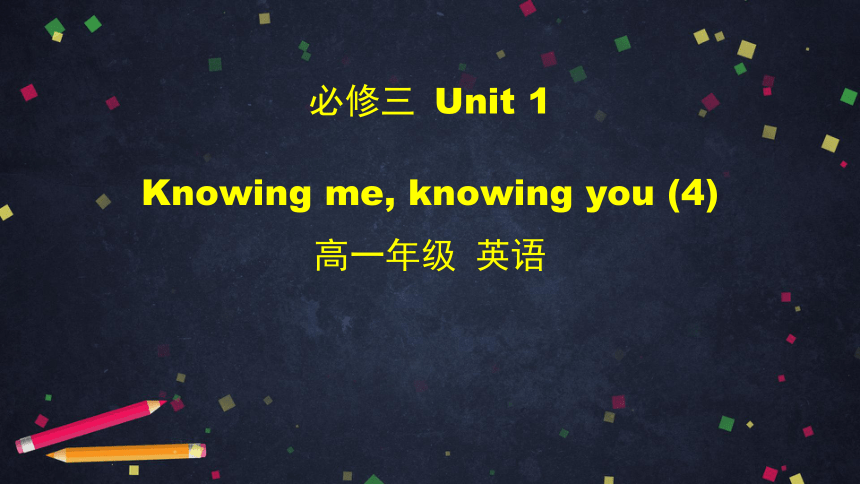 | |
| 格式 | zip | ||
| 文件大小 | 1.8MB | ||
| 资源类型 | 教案 | ||
| 版本资源 | 外研版(2019) | ||
| 科目 | 英语 | ||
| 更新时间 | 2020-06-13 14:47:32 | ||
图片预览

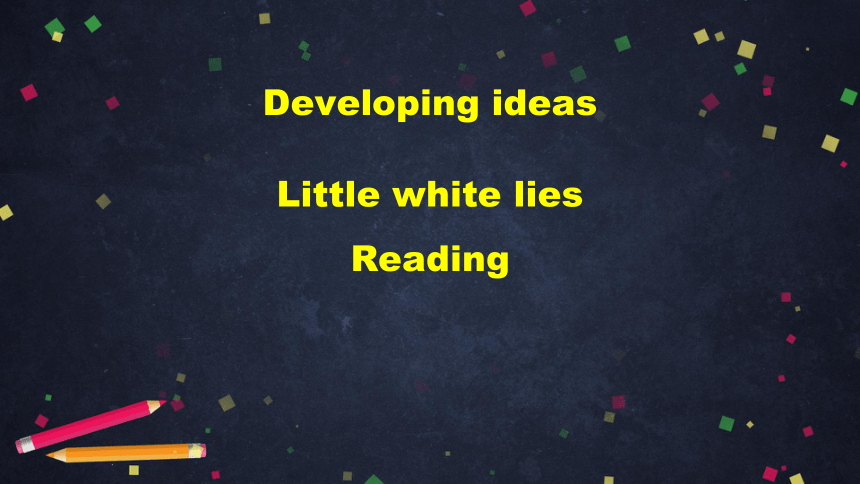
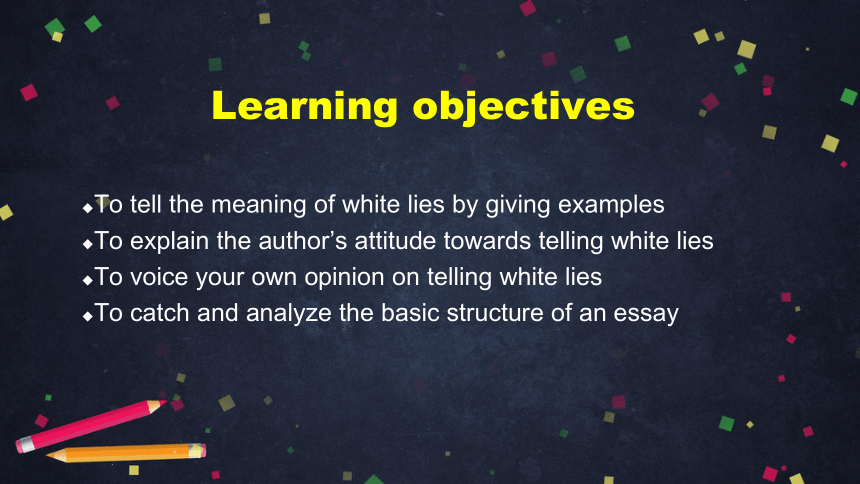
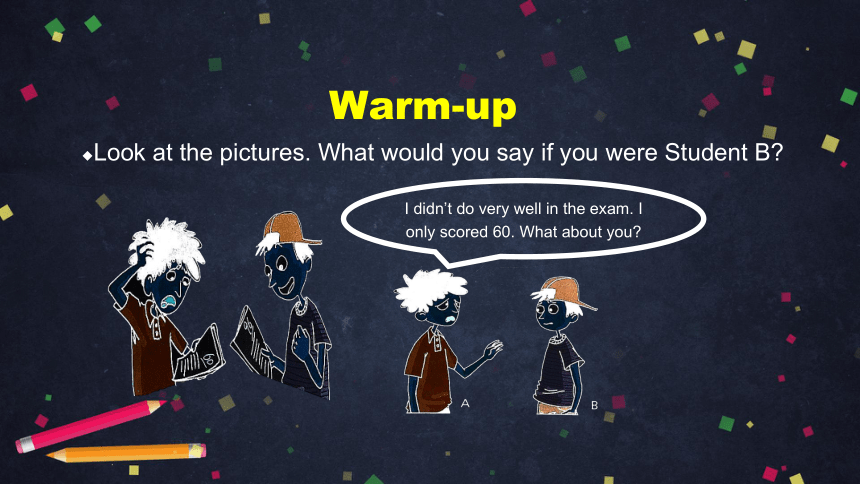
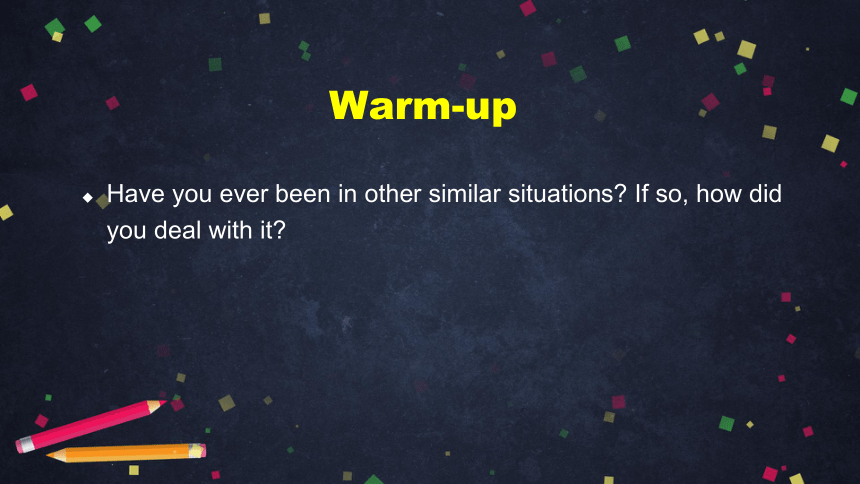
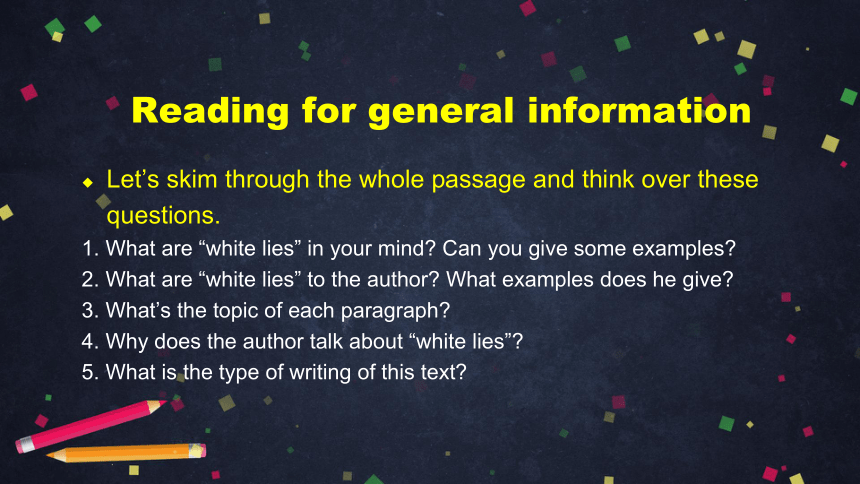
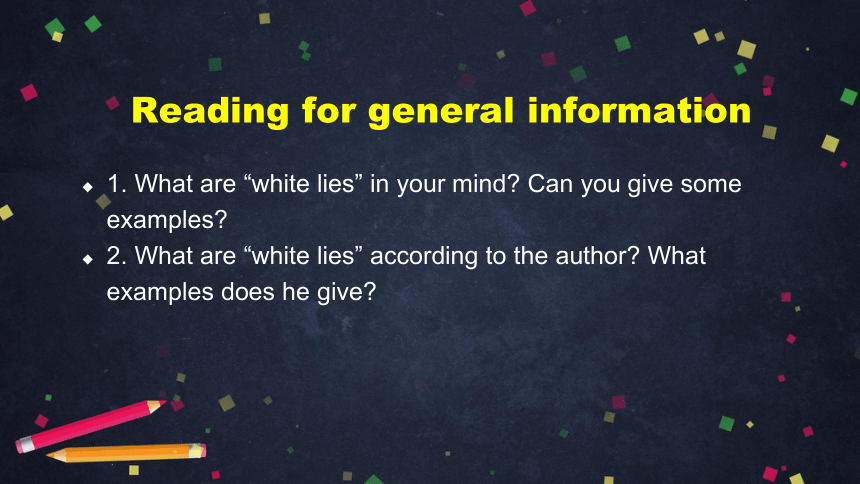
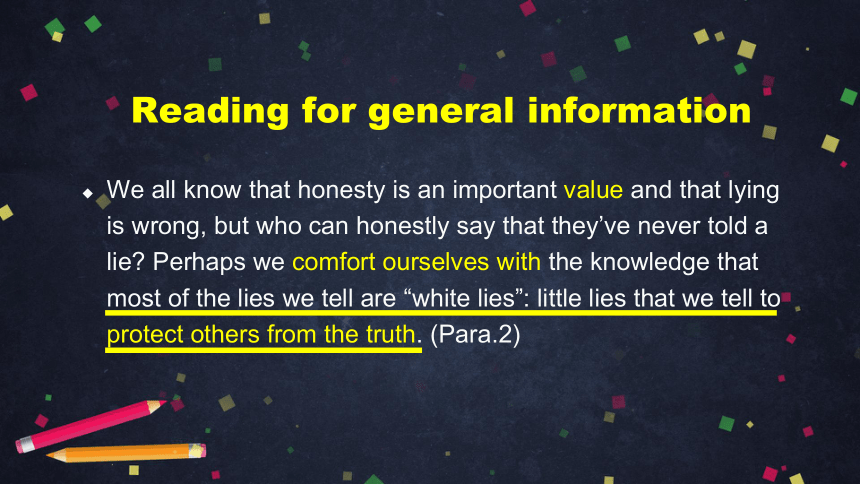
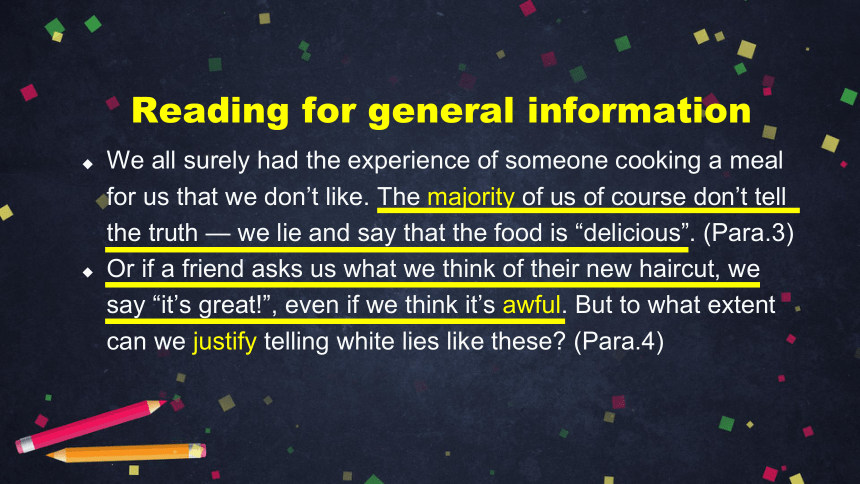
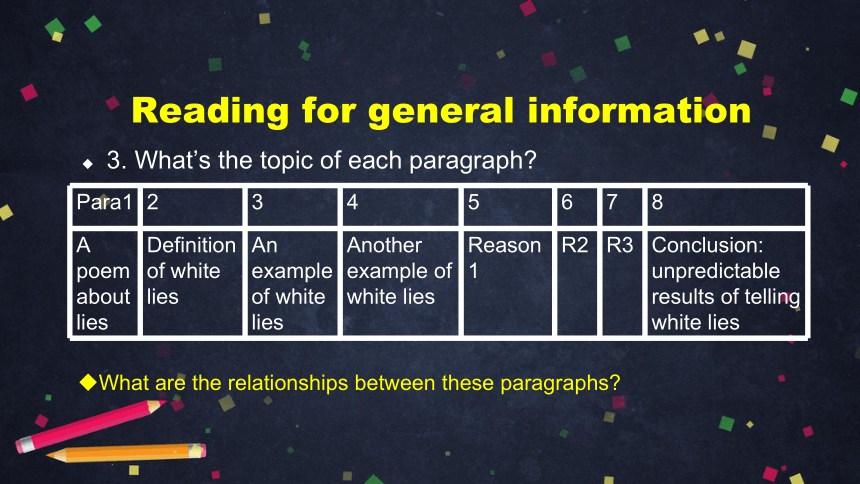
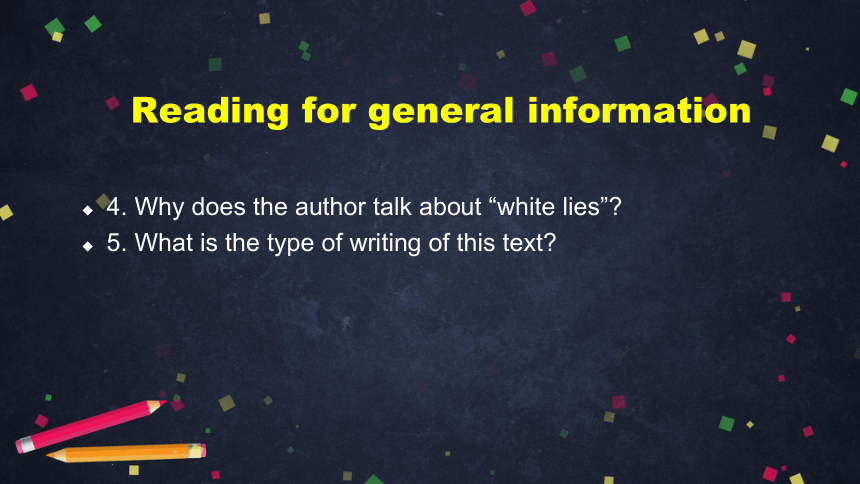
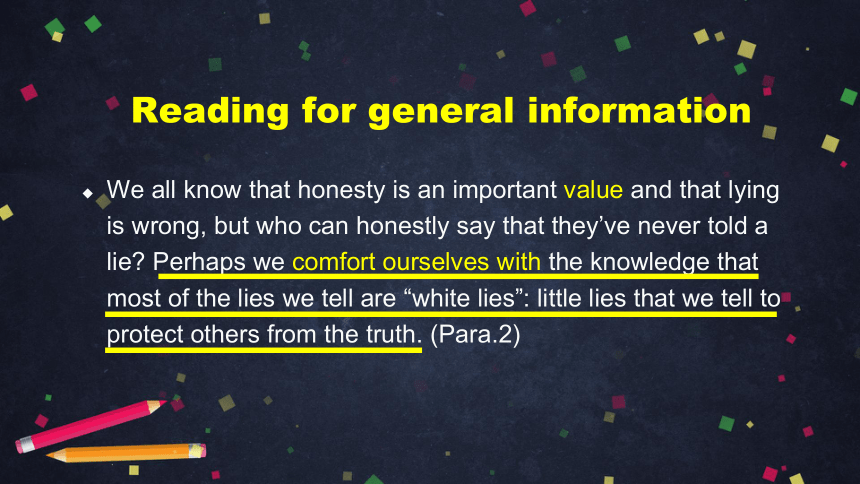
文档简介
(共54张PPT)
必修三
Unit
1
Knowing
me,
knowing
you
(4)
高一年级
英语
Developing
ideas
Little
white
lies
Reading
Learning
objectives
To
tell
the
meaning
of
white
lies
by
giving
examples
To
explain
the
author’s
attitude
towards
telling
white
lies
To
voice
your
own
opinion
on
telling
white
lies
To
catch
and
analyze
the
basic
structure
of
an
essay
Warm-up
Look
at
the
pictures.
What
would
you
say
if
you
were
Student
B?
I
didn’t
do
very
well
in
the
exam.
I
only
scored
60.
What
about
you?
Warm-up
Have
you
ever
been
in
other
similar
situations?
If
so,
how
did
you
deal
with
it?
Reading
for
general
information
Let’s
skim
through
the
whole
passage
and
think
over
these
questions.
1.
What
are
“white
lies”
in
your
mind?
Can
you
give
some
examples?
2.
What
are
“white
lies”
to
the
author?
What
examples
does
he
give?
3.
What’s
the
topic
of
each
paragraph?
4.
Why
does
the
author
talk
about
“white
lies”?
5.
What
is
the
type
of
writing
of
this
text?
1.
What
are
“white
lies”
in
your
mind?
Can
you
give
some
examples?
2.
What
are
“white
lies”
according
to
the
author?
What
examples
does
he
give?
Reading
for
general
information
We
all
know
that
honesty
is
an
important
value
and
that
lying
is
wrong,
but
who
can
honestly
say
that
they’ve
never
told
a
lie?
Perhaps
we
comfort
ourselves
with
the
knowledge
that
most
of
the
lies
we
tell
are
“white
lies”:
little
lies
that
we
tell
to
protect
others
from
the
truth.
(Para.2)
Reading
for
general
information
We
all
surely
had
the
experience
of
someone
cooking
a
meal
for
us
that
we
don’t
like.
The
majority
of
us
of
course
don’t
tell
the
truth
—
we
lie
and
say
that
the
food
is
“delicious”.
(Para.3)
Or
if
a
friend
asks
us
what
we
think
of
their
new
haircut,
we
say
“it’s
great!”,
even
if
we
think
it’s
awful.
But
to
what
extent
can
we
justify
telling
white
lies
like
these?
(Para.4)
Reading
for
general
information
Reading
for
general
information
3.
What’s
the
topic
of
each
paragraph?
Para1
2
3
4
5
6
7
8
A
poem
about
lies
Definition
of
white
lies
An
example
of
white
lies
Another
example
of
white
lies
Reason1
R2
R3
Conclusion:
unpredictable
results
of
telling
white
lies
What
are
the
relationships
between
these
paragraphs?
4.
Why
does
the
author
talk
about
“white
lies”?
5.
What
is
the
type
of
writing
of
this
text?
Reading
for
general
information
We
all
know
that
honesty
is
an
important
value
and
that
lying
is
wrong,
but
who
can
honestly
say
that
they’ve
never
told
a
lie?
Perhaps
we
comfort
ourselves
with
the
knowledge
that
most
of
the
lies
we
tell
are
“white
lies”:
little
lies
that
we
tell
to
protect
others
from
the
truth.
(Para.2)
Reading
for
general
information
We
all
surely
had
the
experience
of
someone
cooking
a
meal
for
us
that
we
don’t
like.
The
majority
of
us
of
course
don’t
tell
the
truth
—
we
lie
and
say
that
the
food
is
“delicious”.
(Para.3)
Or
if
a
friend
asks
us
what
we
think
of
their
new
haircut,
we
say
“it’s
great!”,
even
if
we
think
it’s
awful.
But
to
what
extent
can
we
justify
telling
white
lies
like
these?
(Para.4)
Reading
for
general
information
Let’s
read
the
passage
in
detail
and
think
over
these
questions.
1.
What
is
the
author’s
attitude
toward
telling
“white
lies”?
2.
What
does
he
say
to
support
his
ideas
and
how
does
he
do
it?
3.
What
does
the
author
say
to
assure
you
of
his
ideas
in
the
end?
4.
What
is
the
structure
of
this
article?
Reading
for
detailed
information
1.
What
is
the
author’s
attitude
toward
telling
“white
lies”?
2.
What
does
he
say
to
support
his
ideas
and
how
does
he
do
it?
Reading
for
detailed
information
We
all
surely
had
the
experience
of
someone
cooking
a
meal
for
us
that
we
don’t
like.
The
majority
of
us
of
course
don’t
tell
the
truth
—
we
lie
and
say
that
the
food
is
“delicious”.
(Para.3)
Or
if
a
friend
asks
us
what
we
think
of
their
new
haircut,
we
say
“it’s
great!”,
even
if
we
think
it’s
awful.
But
to
what
extent
can
we
justify
telling
white
lies
like
these?
(Para.4)
Reading
for
detailed
information
One
of
the
main
reasons
for
telling
a
white
lie
is
to
try
to
make
others
feel
better.
However,
when
we
lie
and
say
that
someone’s
haircut
looks
good,
or
when
we
say
that
we
love
a
meal
that
we
secretly
hate,
are
we
really
hoping
to
improve
the
situation
for
someone
else?
Perhaps
we
are
in
fact
lying
to
protect
ourselves
from
the
disappointment
and
anger
of
others.
(Para.5)
Reading
for
detailed
information
Another
reason
for
telling
a
white
lie
is
to
give
encouragement.
Say
for
example
that
your
friend
asks
you
what
you
think
of
his
singing.
You
of
course
say
that
it’s
wonderful,
despite
secretly
thinking
that
your
cat
can
sing
better.
Stop
for
a
moment
and
consider
that
perhaps
your
friend
wants
some
frank
comments
from
you
so
that
they
can
improve.
Or
perhaps
they
need
to
know
that
they
should
look
for
a
different
hobby.
(Para.6)
Reading
for
detailed
information
Finally,
we
may
also
tell
a
white
lie
when
we
want
to
protect
others
from
bad
news.
If
you’ve
had
a
bad
day,
do
you
tell
your
parents
about
it
or
do
you
hide
your
tears
and
lie
that
your
day
was
“fine”?
If
the
latter,
don’t
you
think
your
parents
would
want
to
listen
to
you
and
understand
your
feelings?
Wouldn’t
it
be
better
to
respect
their
concern
for
you
and
ask
for
their
advice?
(Para.7)
Reading
for
detailed
information
3.
What
does
the
author
say
to
assure
you
of
his
ideas
in
the
end?
Reading
for
detailed
information
Going
back
to
Walter
Scott’s
lines,
we
may
find
even
white
lies
have
results
we
cannot
know
in
advance.
(Para.8)
Written
more
than
two
hundred
years
ago,
these
lines
by
Walter
Scott
remain
one
of
the
most
well-known
excerpts
of
Scottish
poetry:
oh,
what
a
tangled
web
we
weave,
when
first
we
practice
to
deceive!
(Para.1)
Reading
for
detailed
information
Perhaps
the
meal
you
said
was
“delicious”
will
be
served
every
time
you
visit.
Would
your
friend
trust
your
opinion
again
if
he
found
out
you
had
lied
about
his
“wonderful”
singing?
How
would
you
expect
others
to
truly
understand
your
emotions
if
you
only
shared
good
news
instead
of
bad?
Moreover,
how
would
you
feel
if
you
discovered
that
the
people
closest
to
you
had
been
hiding
the
truth
from
you?
(Para.8)
Reading
for
detailed
information
4.
What
is
the
structure
of
this
article?
Reading
for
detailed
information
Learning
to
learn
An
essay
usually
consists
of
three
parts:
introduction,
main
body
and
conclusion.
Start
with
an
introduction
that
consists
of
the
aims
and
an
overview
of
the
essay.
The
main
body
of
an
essay
is
a
series
of
paragraphs
that
explore
and
develop
your
argument.
The
conclusion
contains
a
summary
of
your
ideas
—
do
not
introduce
any
new
material
here!
End
your
essay
by
linking
your
conclusion
back
to
the
essay
title.
Reading
for
detailed
information
Introduction
Main
body
Conclusion
the
structure
of
an
essay
the
aim
and
an
overview
explore
and
develop
your
argument
a
summary
of
your
ideas
Reading
for
detailed
information
Conclusion
(8)
Reason
2
(6)
Reason
1
(5)
Reason
3
(7)
Introduction
(1-
4)
Reading
for
detailed
information
Introduction
We
know
lying
is
wrong,
so
why
do
we
tell
white
lies?
(We
thought
we
could
justify
the
white
lies
we
tell.)
Reading
for
detailed
information
Let’s
fill
in
the
tables
to
outline
the
detailed
information
Reason
1
To
make
others
___________________
Example(s)
Someone’s
cooking
___________________
Someone’s
haircut
_______________________
Analysis
Perhaps
we
lie
to
protect
ourselves
__________________
______________________________
feel
better
is
“great”.
looks
“good”.
from
the
disappointment
and
anger
of
others.
Reading
for
detailed
information
Reason
2
____________________________
Example(s)
____________________________________
Analysis
Perhaps
your
friend
wants
_____________________________________________________________________
Perhaps
they
need
to
know
____________________________________
To
give
others
encouragement
Your
friend’s
singing
is
“wonderful”.
some
frank
comments
from
you
so
as
to
improve
his
singing.
that
they
should
look
for
a
different
hobby.
Reading
for
detailed
information
Reason
3
____________________________
Example(s)
____________________________________
Analysis
Perhaps
your
parents
_____________________________________________________________________
want
to
listen
to
you
and
understand
your
true
feelings.
To
protect
others
from
bad
news
Your
day
was
“fine”.
Reading
for
detailed
information
Conclusion
Even
white
lies
may
have
results
we
cannot
predict.
________________________________________________________________
So
we
can’t
always
justify
telling
white
lies
to
hide
the
truth.
Reading
for
detailed
information
Reading
for
exploration
of
the
theme
Think
and
share
1.
What
does
the
“web”
in
the
poem
represent?
2.
What
would
you
do
in
the
situations
described
in
the
passage?
3.
How
would
you
feel
if
you
were
told
a
white
lie?
Share
your
experience
with
the
class
if
this
has
happened
to
you.
Think
and
share
4.
Why
does
the
author
say
white
lies
are
“little”
white
lies
in
the
title?
5.
What
do
you
think
of
the
“white
lies”
told
to
us
by
our
parents
during
our
process
of
growing
up?
Reading
for
exploration
of
the
theme
Suggestions
on
whites
lies
in
this
situation
Even
the
white
lies
told
to
protect
kids
from
harm
can
have
results
we
can’t
predict
or
even
control.
White
lies
might
harm
the
trust
and
love
among
family
members.
Trust
and
honesty
is
the
key
to
long-term
harmony
and
happiness
or
that
in
the
long
run.
Reading
for
exploration
of
the
theme
Application
Pair
work!
Let’s
work
in
pairs
and
make
a
summary
of
this
article
following
the
structure
of
an
essay.
Listen
to
the
tape
and
imitate
the
pronunciation
and
intonation.
Application
Pair
work!
Let’s
work
in
pairs
and
make
a
summary
of
this
article
following
the
structure
of
an
essay.
Introduction
Main
body
Conclusion
Application
We
all
know
that
honesty
is
an
important
value
and
lying
is
wrong,
but
almost
all
of
us
have
the
experience
of
telling
lies.
Perhaps
we
comfort
ourselves
with
the
knowledge
that
most
of
the
lies
we
tell
are
“white
lies”:
little
lies
that
we
tell
to
protect
others
from
the
truth.
However,
we
can’t
always
justify
the
white
lies
we
tell.
For
one
thing,
we
might
argue
that
we
tell
white
lies
to
try
to
make
others
feel
better.
For
example,
the
majority
of
us
will
lie
and
say
that
the
food
is
“delicious”
when
we
are
Application
served
with
something
we
don’t
like
by
someone
we
value.
Or
we
are
very
likely
to
say
it’s
“great”
if
we
are
asked
for
the
idea
of
someone’s
new
haircut,
even
if
we
actually
think
it’s
awful.
In
these
situations,
perhaps
what
we
do
is
just
to
protect
ourselves
from
the
disappointment
and
anger
of
others.
For
another,
we
also
argue
that
we
tell
white
lies
to
encourage
others.
We
probably
will
say
it’s
“wonderful”
if
someone
asks
us
for
our
opinions
about
their
singing,
even
if
we
might
secretly
think
Application
our
cats
can
sing
better.
But
what
if
our
friend
wants
some
sincere
comments
from
us
or
they
are
just
considering
whether
they
should
look
for
a
new
hobby?
So
in
this
situation,
our
white
lies
might
actually
mislead
them
and
even
harm
them.
What’s
more,
we
may
still
argue
that
we
tell
white
lies
to
protect
others
from
bad
news.
But
how
can
we
know
they
won’t
want
to
listen
to
us
and
understand
our
feelings?
Application
Actually
when
we
first
practice
to
deceive,
even
if
we
just
tell
little
white
lies,
we
may
still
find
us
in
a
big
tangled
web,
which
may
result
in
unpredictable
consequences.
If
you
don’t
want
to
be
served
with
the
food
you
don’t
like
any
more,
lose
trust
of
your
friends,
get
misunderstood
all
the
time,
or
be
hidden
from
the
truth
by
the
people
closest
to
you,
let’s
stop
for
a
moment
and
reconsider
the
issue
whether
we
should
tell
“white
lies”
in
the
future
any
longer.
Little
white
lies
are
not
little.
Application
Pair
work!
Let’s
work
in
pairs
and
make
a
television
talk
show
based
on
the
ideas
of
this
article.
Student
A:
the
host
1.
Greet
the
audience
and
introduce
the
topic
and
the
guest;
2.
Ask
some
questions
prepared;
3.
Make
a
conclusion
in
the
end.
Student
B:
the
author,
Dr.
Brown
Application
A:
Good
evening,
everyone!
Welcome
to
this
TV
talk
show.
Today,
we’ll
talk
about
“white
lies”,
which
is
a
hot
topic
these
days.
We
are
so
lucky
to
have
invited
Dr.
Brown
here
to
share
some
of
his
ideas
on
this
issue.
Great,
Dr.
Brown,
would
you
introduce
yourself
to
us?
B:
Hi,
there!
I’m
Dr.
Brown,
and
I’m
a
psychologist
and
I’m
looking
into
this
issue
these
days.
Application
A:
Great,
Dr.
Brown,
I
just
read
an
article
titled
“Little
white
lies”
from
you.
I
quite
agree
with
you
that
most
of
us
tend
to
comfort
ourselves
with
the
knowledge
that
most
of
the
lies
we
tell
are
white
lies.
White
lies
are
different
from
lies,
right?
B:
Yeah,
they
are
different,
and
most
of
the
white
lies
are
told
to
the
people
we
value,
to
some
extent
out
of
good
purpose.
But
we
cannot
justify
all
of
them.
Application
A:
Well,
can
you
explain
it?
Why
is
it
difficult
to
justify
them?
B:
Of
course,
we
may
tell
white
lies
to
make
others
feel
better,
but
we
may
actually
try
to
say
some
good
words
to
protect
ourselves
from
the
disappointment
and
anger
of
others.
We
may
also
tell
white
lies
to
encourage
others,
but
we
thus
mislead
others
and
even
lose
the
trust
of
others
once
we
are
found
not
telling
the
truth.
Do
you
agree?
Application
A:
You’ve
got
a
point.
What’s
more,
we
may
never
get
understood
if
we
always
try
to
hide
our
feelings
from
the
people
closest
to
us,
even
if
we
just
want
to
protect
them
from
the
bad
news.
White
lies
are
also
harmful.
B:
That’s
right.
White
lies
are
also
lies.
Lies
can
only
make
the
web
even
more
tangled.
White
lies
won’t
make
it
better.
A:
So
little
white
lies
are
not
little.
To
transfer
Group
work!
Let’s
work
in
groups
and
give
a
talk
on
the
importance
of
honesty
following
the
steps
below.
Explain
what
honesty
is.
Give
reasons
for
the
importance
of
being
honest.
Support
your
reasons
with
examples.
End
with
your
conclusion.
To
transfer
Ever
since
we
were
born,
we
have
been
told
to
be
honest.
When
we
were
children,
we
thought
to
be
honest
was
not
to
tell
lies.
However,
being
honest
is
more
than
not
telling
lies.
A
more
complete
definition
of
honesty
shows
that
an
honest
person
doesn’t
do
things
that
are
morally
wrong.
If
something
you
do
is
breaking
the
law
or
if
you
have
to
hide
what
you
are
doing
because
you’ll
get
in
trouble,
you
are
probably
not
being
honest.
So,
honesty
is
about
speaking
and
acting
truthfully.
To
transfer
Honesty
is
an
important
value,
and
there
are
several
reasons
for
its
importance.
One
of
the
main
reasons
for
being
honest
is
that
it’s
the
basis
of
good
interpersonal
relationship.
If
we
are
honest
to
the
people
around
us,
we
will
surely
gain
their
trust
and
sincerity.
For
example,
it’s
not
unusual
to
see
people
who
are
honest
surrounded
by
lots
of
good
friends.
To
transfer
Another
reason
for
being
honest
is
that
it
is
one
of
the
main
factors
of
the
well-being
of
the
society.
For
example,
if
teachers
don’t
impart
students
true
knowledge,
businessmen
don’t
sell
good
quality
goods,
doctors
don’t
make
reliable
diagnoses,
and
lawyers
don’t
defend
justice,
what
a
place
our
society
will
become?
Thus,
we
can
recognize
the
importance
of
honesty.
To
transfer
Finally,
we
can
also
recognize
the
importance
of
honesty
if
we
take
notice
of
its
important
role
in
raising
the
younger
generations.
The
teenagers
are
said
to
be
open
to
various
values
and
outlooks.
Being
treated
dishonestly
or
being
taught
to
be
dishonest,
they
may
never
believe
in
honesty,
which
is
really
a
nightmare
for
the
young.
For
example,
we
can
see
lots
of
hopeless
adolescents
coming
from
dishonest
families.
It’s
really
hard
for
them
to
live
a
happy
life.
To
transfer
All
in
all,
we
cannot
deny
that
it’s
really
important
to
be
honest.
For
the
sake
of
the
well-being
of
ourselves,
the
sustainable
development
of
our
society,
and
the
healthy
growth
of
the
younger
generations,
let’s
attach
great
importance
to
being
honest
and
make
honesty
our
priority
of
dealing
with
all
the
things
we’ve
got
to
do.
meaning
of
white
lies
the
author’s
attitude
toward
telling
white
lies
your
own
opinions
on
telling
white
lies
the
basic
structure
of
an
essay
05
readiness
to
voice
your
own
opinions
on
various
issues
01
02
03
04
Summary
Homework
1.
Read
the
articles
on
page
8-9
aloud.
2.
Complete
the
exercises
of
the
work
sheet.
3.
Write
an
essay
to
voice
your
opinions
on
whether
there
should
be
white
lies
between
family
members
within
100
words.
Thanks!
必修三
Unit
1
Knowing
me,
knowing
you
(4)
高一年级
英语
Developing
ideas
Little
white
lies
Reading
Learning
objectives
To
tell
the
meaning
of
white
lies
by
giving
examples
To
explain
the
author’s
attitude
towards
telling
white
lies
To
voice
your
own
opinion
on
telling
white
lies
To
catch
and
analyze
the
basic
structure
of
an
essay
Warm-up
Look
at
the
pictures.
What
would
you
say
if
you
were
Student
B?
I
didn’t
do
very
well
in
the
exam.
I
only
scored
60.
What
about
you?
Warm-up
Have
you
ever
been
in
other
similar
situations?
If
so,
how
did
you
deal
with
it?
Reading
for
general
information
Let’s
skim
through
the
whole
passage
and
think
over
these
questions.
1.
What
are
“white
lies”
in
your
mind?
Can
you
give
some
examples?
2.
What
are
“white
lies”
to
the
author?
What
examples
does
he
give?
3.
What’s
the
topic
of
each
paragraph?
4.
Why
does
the
author
talk
about
“white
lies”?
5.
What
is
the
type
of
writing
of
this
text?
1.
What
are
“white
lies”
in
your
mind?
Can
you
give
some
examples?
2.
What
are
“white
lies”
according
to
the
author?
What
examples
does
he
give?
Reading
for
general
information
We
all
know
that
honesty
is
an
important
value
and
that
lying
is
wrong,
but
who
can
honestly
say
that
they’ve
never
told
a
lie?
Perhaps
we
comfort
ourselves
with
the
knowledge
that
most
of
the
lies
we
tell
are
“white
lies”:
little
lies
that
we
tell
to
protect
others
from
the
truth.
(Para.2)
Reading
for
general
information
We
all
surely
had
the
experience
of
someone
cooking
a
meal
for
us
that
we
don’t
like.
The
majority
of
us
of
course
don’t
tell
the
truth
—
we
lie
and
say
that
the
food
is
“delicious”.
(Para.3)
Or
if
a
friend
asks
us
what
we
think
of
their
new
haircut,
we
say
“it’s
great!”,
even
if
we
think
it’s
awful.
But
to
what
extent
can
we
justify
telling
white
lies
like
these?
(Para.4)
Reading
for
general
information
Reading
for
general
information
3.
What’s
the
topic
of
each
paragraph?
Para1
2
3
4
5
6
7
8
A
poem
about
lies
Definition
of
white
lies
An
example
of
white
lies
Another
example
of
white
lies
Reason1
R2
R3
Conclusion:
unpredictable
results
of
telling
white
lies
What
are
the
relationships
between
these
paragraphs?
4.
Why
does
the
author
talk
about
“white
lies”?
5.
What
is
the
type
of
writing
of
this
text?
Reading
for
general
information
We
all
know
that
honesty
is
an
important
value
and
that
lying
is
wrong,
but
who
can
honestly
say
that
they’ve
never
told
a
lie?
Perhaps
we
comfort
ourselves
with
the
knowledge
that
most
of
the
lies
we
tell
are
“white
lies”:
little
lies
that
we
tell
to
protect
others
from
the
truth.
(Para.2)
Reading
for
general
information
We
all
surely
had
the
experience
of
someone
cooking
a
meal
for
us
that
we
don’t
like.
The
majority
of
us
of
course
don’t
tell
the
truth
—
we
lie
and
say
that
the
food
is
“delicious”.
(Para.3)
Or
if
a
friend
asks
us
what
we
think
of
their
new
haircut,
we
say
“it’s
great!”,
even
if
we
think
it’s
awful.
But
to
what
extent
can
we
justify
telling
white
lies
like
these?
(Para.4)
Reading
for
general
information
Let’s
read
the
passage
in
detail
and
think
over
these
questions.
1.
What
is
the
author’s
attitude
toward
telling
“white
lies”?
2.
What
does
he
say
to
support
his
ideas
and
how
does
he
do
it?
3.
What
does
the
author
say
to
assure
you
of
his
ideas
in
the
end?
4.
What
is
the
structure
of
this
article?
Reading
for
detailed
information
1.
What
is
the
author’s
attitude
toward
telling
“white
lies”?
2.
What
does
he
say
to
support
his
ideas
and
how
does
he
do
it?
Reading
for
detailed
information
We
all
surely
had
the
experience
of
someone
cooking
a
meal
for
us
that
we
don’t
like.
The
majority
of
us
of
course
don’t
tell
the
truth
—
we
lie
and
say
that
the
food
is
“delicious”.
(Para.3)
Or
if
a
friend
asks
us
what
we
think
of
their
new
haircut,
we
say
“it’s
great!”,
even
if
we
think
it’s
awful.
But
to
what
extent
can
we
justify
telling
white
lies
like
these?
(Para.4)
Reading
for
detailed
information
One
of
the
main
reasons
for
telling
a
white
lie
is
to
try
to
make
others
feel
better.
However,
when
we
lie
and
say
that
someone’s
haircut
looks
good,
or
when
we
say
that
we
love
a
meal
that
we
secretly
hate,
are
we
really
hoping
to
improve
the
situation
for
someone
else?
Perhaps
we
are
in
fact
lying
to
protect
ourselves
from
the
disappointment
and
anger
of
others.
(Para.5)
Reading
for
detailed
information
Another
reason
for
telling
a
white
lie
is
to
give
encouragement.
Say
for
example
that
your
friend
asks
you
what
you
think
of
his
singing.
You
of
course
say
that
it’s
wonderful,
despite
secretly
thinking
that
your
cat
can
sing
better.
Stop
for
a
moment
and
consider
that
perhaps
your
friend
wants
some
frank
comments
from
you
so
that
they
can
improve.
Or
perhaps
they
need
to
know
that
they
should
look
for
a
different
hobby.
(Para.6)
Reading
for
detailed
information
Finally,
we
may
also
tell
a
white
lie
when
we
want
to
protect
others
from
bad
news.
If
you’ve
had
a
bad
day,
do
you
tell
your
parents
about
it
or
do
you
hide
your
tears
and
lie
that
your
day
was
“fine”?
If
the
latter,
don’t
you
think
your
parents
would
want
to
listen
to
you
and
understand
your
feelings?
Wouldn’t
it
be
better
to
respect
their
concern
for
you
and
ask
for
their
advice?
(Para.7)
Reading
for
detailed
information
3.
What
does
the
author
say
to
assure
you
of
his
ideas
in
the
end?
Reading
for
detailed
information
Going
back
to
Walter
Scott’s
lines,
we
may
find
even
white
lies
have
results
we
cannot
know
in
advance.
(Para.8)
Written
more
than
two
hundred
years
ago,
these
lines
by
Walter
Scott
remain
one
of
the
most
well-known
excerpts
of
Scottish
poetry:
oh,
what
a
tangled
web
we
weave,
when
first
we
practice
to
deceive!
(Para.1)
Reading
for
detailed
information
Perhaps
the
meal
you
said
was
“delicious”
will
be
served
every
time
you
visit.
Would
your
friend
trust
your
opinion
again
if
he
found
out
you
had
lied
about
his
“wonderful”
singing?
How
would
you
expect
others
to
truly
understand
your
emotions
if
you
only
shared
good
news
instead
of
bad?
Moreover,
how
would
you
feel
if
you
discovered
that
the
people
closest
to
you
had
been
hiding
the
truth
from
you?
(Para.8)
Reading
for
detailed
information
4.
What
is
the
structure
of
this
article?
Reading
for
detailed
information
Learning
to
learn
An
essay
usually
consists
of
three
parts:
introduction,
main
body
and
conclusion.
Start
with
an
introduction
that
consists
of
the
aims
and
an
overview
of
the
essay.
The
main
body
of
an
essay
is
a
series
of
paragraphs
that
explore
and
develop
your
argument.
The
conclusion
contains
a
summary
of
your
ideas
—
do
not
introduce
any
new
material
here!
End
your
essay
by
linking
your
conclusion
back
to
the
essay
title.
Reading
for
detailed
information
Introduction
Main
body
Conclusion
the
structure
of
an
essay
the
aim
and
an
overview
explore
and
develop
your
argument
a
summary
of
your
ideas
Reading
for
detailed
information
Conclusion
(8)
Reason
2
(6)
Reason
1
(5)
Reason
3
(7)
Introduction
(1-
4)
Reading
for
detailed
information
Introduction
We
know
lying
is
wrong,
so
why
do
we
tell
white
lies?
(We
thought
we
could
justify
the
white
lies
we
tell.)
Reading
for
detailed
information
Let’s
fill
in
the
tables
to
outline
the
detailed
information
Reason
1
To
make
others
___________________
Example(s)
Someone’s
cooking
___________________
Someone’s
haircut
_______________________
Analysis
Perhaps
we
lie
to
protect
ourselves
__________________
______________________________
feel
better
is
“great”.
looks
“good”.
from
the
disappointment
and
anger
of
others.
Reading
for
detailed
information
Reason
2
____________________________
Example(s)
____________________________________
Analysis
Perhaps
your
friend
wants
_____________________________________________________________________
Perhaps
they
need
to
know
____________________________________
To
give
others
encouragement
Your
friend’s
singing
is
“wonderful”.
some
frank
comments
from
you
so
as
to
improve
his
singing.
that
they
should
look
for
a
different
hobby.
Reading
for
detailed
information
Reason
3
____________________________
Example(s)
____________________________________
Analysis
Perhaps
your
parents
_____________________________________________________________________
want
to
listen
to
you
and
understand
your
true
feelings.
To
protect
others
from
bad
news
Your
day
was
“fine”.
Reading
for
detailed
information
Conclusion
Even
white
lies
may
have
results
we
cannot
predict.
________________________________________________________________
So
we
can’t
always
justify
telling
white
lies
to
hide
the
truth.
Reading
for
detailed
information
Reading
for
exploration
of
the
theme
Think
and
share
1.
What
does
the
“web”
in
the
poem
represent?
2.
What
would
you
do
in
the
situations
described
in
the
passage?
3.
How
would
you
feel
if
you
were
told
a
white
lie?
Share
your
experience
with
the
class
if
this
has
happened
to
you.
Think
and
share
4.
Why
does
the
author
say
white
lies
are
“little”
white
lies
in
the
title?
5.
What
do
you
think
of
the
“white
lies”
told
to
us
by
our
parents
during
our
process
of
growing
up?
Reading
for
exploration
of
the
theme
Suggestions
on
whites
lies
in
this
situation
Even
the
white
lies
told
to
protect
kids
from
harm
can
have
results
we
can’t
predict
or
even
control.
White
lies
might
harm
the
trust
and
love
among
family
members.
Trust
and
honesty
is
the
key
to
long-term
harmony
and
happiness
or
that
in
the
long
run.
Reading
for
exploration
of
the
theme
Application
Pair
work!
Let’s
work
in
pairs
and
make
a
summary
of
this
article
following
the
structure
of
an
essay.
Listen
to
the
tape
and
imitate
the
pronunciation
and
intonation.
Application
Pair
work!
Let’s
work
in
pairs
and
make
a
summary
of
this
article
following
the
structure
of
an
essay.
Introduction
Main
body
Conclusion
Application
We
all
know
that
honesty
is
an
important
value
and
lying
is
wrong,
but
almost
all
of
us
have
the
experience
of
telling
lies.
Perhaps
we
comfort
ourselves
with
the
knowledge
that
most
of
the
lies
we
tell
are
“white
lies”:
little
lies
that
we
tell
to
protect
others
from
the
truth.
However,
we
can’t
always
justify
the
white
lies
we
tell.
For
one
thing,
we
might
argue
that
we
tell
white
lies
to
try
to
make
others
feel
better.
For
example,
the
majority
of
us
will
lie
and
say
that
the
food
is
“delicious”
when
we
are
Application
served
with
something
we
don’t
like
by
someone
we
value.
Or
we
are
very
likely
to
say
it’s
“great”
if
we
are
asked
for
the
idea
of
someone’s
new
haircut,
even
if
we
actually
think
it’s
awful.
In
these
situations,
perhaps
what
we
do
is
just
to
protect
ourselves
from
the
disappointment
and
anger
of
others.
For
another,
we
also
argue
that
we
tell
white
lies
to
encourage
others.
We
probably
will
say
it’s
“wonderful”
if
someone
asks
us
for
our
opinions
about
their
singing,
even
if
we
might
secretly
think
Application
our
cats
can
sing
better.
But
what
if
our
friend
wants
some
sincere
comments
from
us
or
they
are
just
considering
whether
they
should
look
for
a
new
hobby?
So
in
this
situation,
our
white
lies
might
actually
mislead
them
and
even
harm
them.
What’s
more,
we
may
still
argue
that
we
tell
white
lies
to
protect
others
from
bad
news.
But
how
can
we
know
they
won’t
want
to
listen
to
us
and
understand
our
feelings?
Application
Actually
when
we
first
practice
to
deceive,
even
if
we
just
tell
little
white
lies,
we
may
still
find
us
in
a
big
tangled
web,
which
may
result
in
unpredictable
consequences.
If
you
don’t
want
to
be
served
with
the
food
you
don’t
like
any
more,
lose
trust
of
your
friends,
get
misunderstood
all
the
time,
or
be
hidden
from
the
truth
by
the
people
closest
to
you,
let’s
stop
for
a
moment
and
reconsider
the
issue
whether
we
should
tell
“white
lies”
in
the
future
any
longer.
Little
white
lies
are
not
little.
Application
Pair
work!
Let’s
work
in
pairs
and
make
a
television
talk
show
based
on
the
ideas
of
this
article.
Student
A:
the
host
1.
Greet
the
audience
and
introduce
the
topic
and
the
guest;
2.
Ask
some
questions
prepared;
3.
Make
a
conclusion
in
the
end.
Student
B:
the
author,
Dr.
Brown
Application
A:
Good
evening,
everyone!
Welcome
to
this
TV
talk
show.
Today,
we’ll
talk
about
“white
lies”,
which
is
a
hot
topic
these
days.
We
are
so
lucky
to
have
invited
Dr.
Brown
here
to
share
some
of
his
ideas
on
this
issue.
Great,
Dr.
Brown,
would
you
introduce
yourself
to
us?
B:
Hi,
there!
I’m
Dr.
Brown,
and
I’m
a
psychologist
and
I’m
looking
into
this
issue
these
days.
Application
A:
Great,
Dr.
Brown,
I
just
read
an
article
titled
“Little
white
lies”
from
you.
I
quite
agree
with
you
that
most
of
us
tend
to
comfort
ourselves
with
the
knowledge
that
most
of
the
lies
we
tell
are
white
lies.
White
lies
are
different
from
lies,
right?
B:
Yeah,
they
are
different,
and
most
of
the
white
lies
are
told
to
the
people
we
value,
to
some
extent
out
of
good
purpose.
But
we
cannot
justify
all
of
them.
Application
A:
Well,
can
you
explain
it?
Why
is
it
difficult
to
justify
them?
B:
Of
course,
we
may
tell
white
lies
to
make
others
feel
better,
but
we
may
actually
try
to
say
some
good
words
to
protect
ourselves
from
the
disappointment
and
anger
of
others.
We
may
also
tell
white
lies
to
encourage
others,
but
we
thus
mislead
others
and
even
lose
the
trust
of
others
once
we
are
found
not
telling
the
truth.
Do
you
agree?
Application
A:
You’ve
got
a
point.
What’s
more,
we
may
never
get
understood
if
we
always
try
to
hide
our
feelings
from
the
people
closest
to
us,
even
if
we
just
want
to
protect
them
from
the
bad
news.
White
lies
are
also
harmful.
B:
That’s
right.
White
lies
are
also
lies.
Lies
can
only
make
the
web
even
more
tangled.
White
lies
won’t
make
it
better.
A:
So
little
white
lies
are
not
little.
To
transfer
Group
work!
Let’s
work
in
groups
and
give
a
talk
on
the
importance
of
honesty
following
the
steps
below.
Explain
what
honesty
is.
Give
reasons
for
the
importance
of
being
honest.
Support
your
reasons
with
examples.
End
with
your
conclusion.
To
transfer
Ever
since
we
were
born,
we
have
been
told
to
be
honest.
When
we
were
children,
we
thought
to
be
honest
was
not
to
tell
lies.
However,
being
honest
is
more
than
not
telling
lies.
A
more
complete
definition
of
honesty
shows
that
an
honest
person
doesn’t
do
things
that
are
morally
wrong.
If
something
you
do
is
breaking
the
law
or
if
you
have
to
hide
what
you
are
doing
because
you’ll
get
in
trouble,
you
are
probably
not
being
honest.
So,
honesty
is
about
speaking
and
acting
truthfully.
To
transfer
Honesty
is
an
important
value,
and
there
are
several
reasons
for
its
importance.
One
of
the
main
reasons
for
being
honest
is
that
it’s
the
basis
of
good
interpersonal
relationship.
If
we
are
honest
to
the
people
around
us,
we
will
surely
gain
their
trust
and
sincerity.
For
example,
it’s
not
unusual
to
see
people
who
are
honest
surrounded
by
lots
of
good
friends.
To
transfer
Another
reason
for
being
honest
is
that
it
is
one
of
the
main
factors
of
the
well-being
of
the
society.
For
example,
if
teachers
don’t
impart
students
true
knowledge,
businessmen
don’t
sell
good
quality
goods,
doctors
don’t
make
reliable
diagnoses,
and
lawyers
don’t
defend
justice,
what
a
place
our
society
will
become?
Thus,
we
can
recognize
the
importance
of
honesty.
To
transfer
Finally,
we
can
also
recognize
the
importance
of
honesty
if
we
take
notice
of
its
important
role
in
raising
the
younger
generations.
The
teenagers
are
said
to
be
open
to
various
values
and
outlooks.
Being
treated
dishonestly
or
being
taught
to
be
dishonest,
they
may
never
believe
in
honesty,
which
is
really
a
nightmare
for
the
young.
For
example,
we
can
see
lots
of
hopeless
adolescents
coming
from
dishonest
families.
It’s
really
hard
for
them
to
live
a
happy
life.
To
transfer
All
in
all,
we
cannot
deny
that
it’s
really
important
to
be
honest.
For
the
sake
of
the
well-being
of
ourselves,
the
sustainable
development
of
our
society,
and
the
healthy
growth
of
the
younger
generations,
let’s
attach
great
importance
to
being
honest
and
make
honesty
our
priority
of
dealing
with
all
the
things
we’ve
got
to
do.
meaning
of
white
lies
the
author’s
attitude
toward
telling
white
lies
your
own
opinions
on
telling
white
lies
the
basic
structure
of
an
essay
05
readiness
to
voice
your
own
opinions
on
various
issues
01
02
03
04
Summary
Homework
1.
Read
the
articles
on
page
8-9
aloud.
2.
Complete
the
exercises
of
the
work
sheet.
3.
Write
an
essay
to
voice
your
opinions
on
whether
there
should
be
white
lies
between
family
members
within
100
words.
Thanks!
